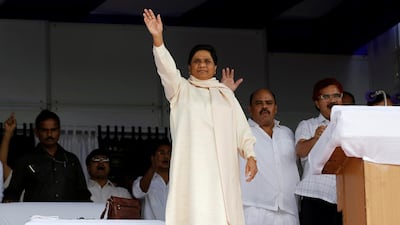India’s ruling Bharatiya Janata Party has come under fire after one of its leaders described prominent opposition leader Mayawati as a “blot on womankind” and “worse than a transgender”.
Mayawati, who goes by one name, is the head of Bahujan Samaj Party (BSP) and a prominent figure among India’s lower-caste communities commonly referred to as Dalits and Bahujans.
The remarks by Sadhana Singh, a BJP member of the Uttar Pradesh state legislative assembly, were recorded in footage of a party rally on Saturday.
“I don’t think Uttar Pradesh’s former chief minister is a woman or a man. She doesn’t understand the concept of dignity," Ms Singh said.
The National Commission for Women has issued a notice seeking explanation of the remarks, which political activists have characterised them as an example of the misogynist and casteist policies practised by the Hindu nationalist BJP.
"The last few years have seen a multifold rise in the movement against caste-based discrimination, so much so that those in the ruling party feel threatened," said Siddharth Gaware, Maharashtra state president of Rashtriya Soshit Parishad (National Council for Marginalised). "They are afraid, and such statements are a sign of their fear," he told The National.
Caste is a sensitive and defining issue in Indian politics. Despite being abolished under India's post-independence constitution, it continues to influence social and political dynamics.
Policies implemented by the BJP since it took power in 2014 have left minority groups feeling marginalised and sparked the mobilisation of anti-caste movements.
Mr Gaware pointed to the annual Dalit commemoration at Koregaon Bhima which drew more than 3 million members of the community. Deadly riots broke out after the gathering last year was attacked, allegedly by upper caste right-wing groups.
“The footfall at the gathering was massive, and a large number of them were the youth from the community who are more educated, aware and empowered with technology. They are changing the face of the movement and BJP and right-wing groups have good reason to fear. The current structure is bound to fall,” Mr Gaware said.
His organisation set up a stall selling copies of the Indian constitution written by B R Ambedkar, who is considered a champion of the lower castes. “We sold over 10,000 copies within a few hours. That shows how fast and effectively we are mobilising,” he said.
Divya Kandukuri, a 22-year-old anti-caste activist, said the insults against Ms Mayawati had only become an issue because of the upcoming general election in April and May.
“This is not the first time Mayawati has been targeted; there were instances when she walked out of parliament because she was called a prostitute,” Ms Kandukuri said.
“This is an issue now because the elections are around the corner, but few people protested when Mayawati was insulted in the parliament. That is how women from the lower caste communities are treated."
Indeed, Mayawati has been attacked on several occasions for not only her caste, but also for not being “womanly” enough.
BJP spokesperson Shaina NC, during an entrepreneurship event in 2014, also questioned Mayawati’s gender, saying she did not know whether the BSP leader was a "he or a she".
“With access to technology we, as oppressed caste women, have some voice in online spaces. However, we still don’t have the support from the larger movements. You won’t find upper caste women activists speaking out for Mayawati,” Ms Kandukuri said.
However, she is hopeful of change.
“There is a certain nuance here, that social media has given the anti-caste movement a platform that most other media have denied. But in the end, a lot of these spaces are also controlled by upper caste men and have on several occasion tried to control these spaces in favour of the ruling party."

